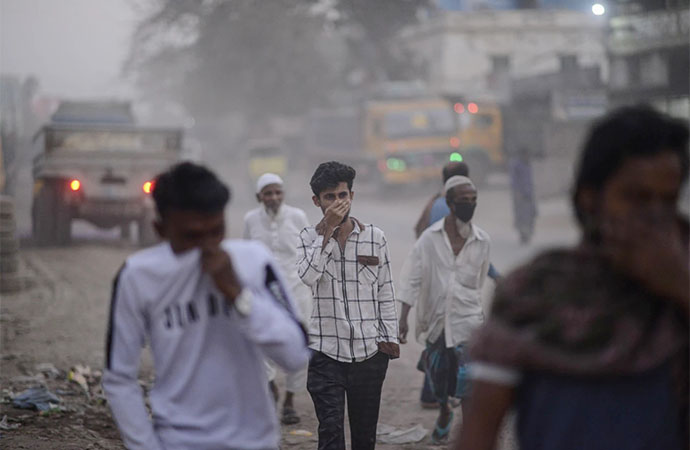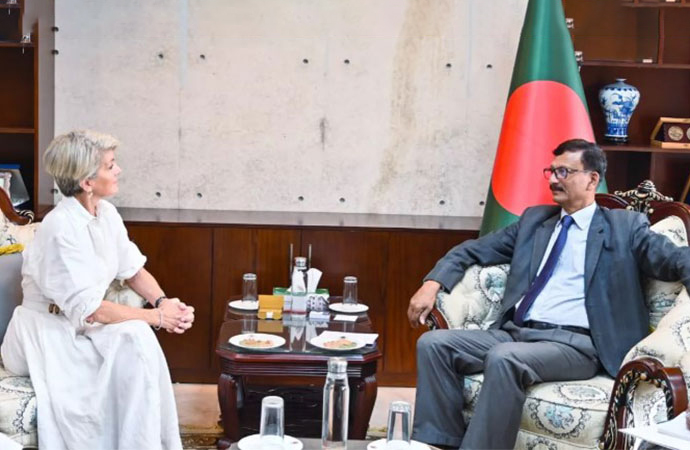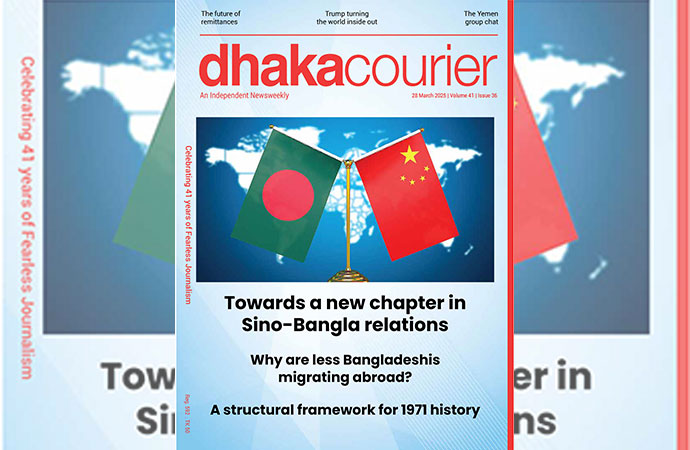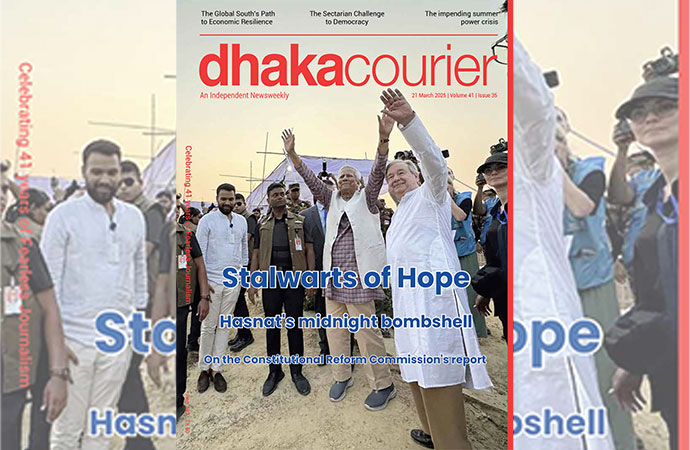Column

The fence surrounding the White House on Pennsylvania Avenue in Washington, Friday, May 24, 2019. Approval was given for a new and taller fence around the White House complex in 2017 and now construction of a almost 13-foot tall fence is slated to begin this summer. (AP/UNB Photo)
President Donald Trump has got himself a wall. But it is not the one of his choosing, as one on the Mexican border. It is on Pennsylvania Avenue, Washington DC, a high fence that now separates him from his people. But as polls for him keep dipping, and the prognosis for a victory in the upcoming November elections keep worsening, a prediction from an unlikely person should bring him cheer. The source is none other than the Foreign Minister of a country that Trump considers to be in the forefront of his list of foes: Javad Zareef of Iran. I have known Zareef and worked with him as a fellow diplomat for years and would rate him as a person of extraordinary intellect. Speaking at an interview on Instagram with an Iranian journalist Farid Modaressi, Zareef stated that despite all that is happening, Trump's support base of 30 to 35 percent has not moved , and till that occurs, he still has over 50 percent chances of re-election. Zareef did not elaborate if he himself would prefer such an outcome, calculating that four more years of America with Trump at its helm , might eliminate that nation totally from the global power scene, which for Zareef and Iran, ought to be a consummation devoutly to be wished!
Whether he gets re-elected or not, Trump is already facing an awkward situation of isolation on an international plane, particularly with regard to western peers of allied countries, whom analysts could be forgiven at this point for calling ex-allies. The logical and mathematical problem is an inverse correlation; it is that the more Trump acts to solidify his base domestically, the distance between him and Western leaders increase, as it were, in a geometric progression. The four major issues are as follows: The first is the ratcheting up of the disputes with China and Iran; the second is the withdrawal from the World Health Organization; the third is the withdrawal from security responsibilities all around the world and the fourth is his unseemly predilection for using force, even active-duty military personnel , to "dominate the streets" (as he says ) of America and quell the ongoing protests.
All these would sit nicely with the far- right redneck, working class America which is Trump's core support base. If he could add to this 'corporate America', the evangelicals, and wean away the Southern whites from the Democratic camp (usually known, dating back to the Nixon era, as the "Southern Strategy") he might have a sufficient segment of the white majority to pull it through. But this would be predicated on his ability to revive the economy. Hence the desperation to 'open-up' despite obvious health hazards to all in general, and to the minority, in particular.
To boost nationalism without having to fight a war, raising the level of heat in the dispute with foreign and culturally different nations like Iran and China would be vote-getting in the American context. Though it was an Englishman, Lord Palmerstone in the 19th century who had said "God made a mistake when He made foreigners", it is most Americans, exhausted with involvements abroad, who actually tend to believe so. Hence the penchant for the return to "fortress America" or back to the "city on a shining hill". While countries of the old world are often wary of nationalism, the cause of many conflicts, jingoism in America is more easily roused. There, many houses would fly the flag -the Star Spangled Banner-and most Americans would sing the national anthem with fervent enthusiasm, and a hand on the heart.
So, it stood to electoral reason when Trump cancelled US participation from the Joint Comprehensive plan of Action (JCPOA), also known as the Iran nuclear deal. It left the other partners, apart from the US and Iran-the European Union, Germany, France, Russia, the United Kingdom and China -holding the ball vis-à-vis Iran, and very angry. Iran, once a screw-driver's turn away from acquisition of nuclear-weapon capability started enriching uranium again, but as of now, has been broadly complying with the regulations. Trump's decision to pull out of the WHO at a time in the perception of others the body was playing an essential role during the Covid-19 pandemic, came as a surprise to the allies. The decision to withdraw US troops from the world's trouble spots perturbed the others. While not all were pleased with China's current global role, they were anxious to keep Beijing engaged and Europe was unwilling to break the economic ties. Finally, the upsurge of the "Black life matters" protests, and the force which Trump was employing to quell them upset his partners no end. Europeans tend to put more store by the value of human rights. So, European leaders realized that in their own domestic situations, as Trump grew increasingly unpopular globally and appeared to endorse breaching of human rights, proximity to him was costing them politically and electorally on their own home grounds.
Therefore, when Trump wanted to host a G-7 meeting in Washington in June to rally friends against China and display that he still wielded some global clout, the other members declined to oblige. Angela Merkel of Germany immediately rejected the invitation. Carl Bildt, former Swedish Prime Minister said, with ample persuasive logic, that the Germans suspected that it would just be a photo-op in the White House. Trump's inexplicable desire to invite Vladimir Putin of Russia as a gues, put his friend Boris Johnson of Britain at odds with him. Also, Justin Trudeau of Canada, who took a knee emphasizing with a race-protesters, and delayed a response to a query on Trump by twenty-two seconds,to the amusement of all present. But Trump was not amused. He called off the G-7 meeting and announced his intention to reduce troop-presence in Germany. Scott Morrison of Australia was a rare case of one who remained loyal to Trump, but was cut adrift. He was left to fend for himself in his battle with an assertive Xi Jinping of China, as also with one of his own States, Victoria, which was unwilling to reduce ties with China.
Consequently, Trump was left ploughing a lonely furrow, fenced in at the White house. Some analysts, with regard to him, have raised the specter of 'Gottendammarung", which is German for 'The twilight of the gods'. It is derived from the last of the four cycles of Richard Wagner's celebrated dramatic rendition of the mythical tale of "The Ring of the Nibelungen". This opera ends with the palace of the Norse gods, the Valhalla, with all its inmates, consumed in and utterly destroyed by a horrific conflagration, epitomizing the end of a society or regime in violent catastrophe. This could be an exaggerated vision of the conclusion of the Trump era, but the prospects of such a possibility is gaining currency.
Dr Iftekhar Ahmed Chowdhury is Principal Research Fellow at the Institute of South Asia Studies, National University of Singapore. He is a former Foreign Advisor (Foreign Minister) of Bangladesh and President of Cosmos Foundation Bangladesh. The views addressed in the article are his own. He can be reached at: isasiac @nus.edu.sg
Creator: Carolyn Kaster, Credit: AP, Copyright: AP2014

























Leave a Comment
Recent Posts
Showcasing why Bangladesh 2.0 ...
Conventional wisdom states that interim periods of transition are not ...
Drik holds solidarity rally in ...
In protest against the ongoing genocide and Israeli war crimes backed ...
Hong Kong painter explores city’s history at Art Bas ..
Can the Global South create a unified vision for mod ..
Finance Adviser Dr Salehuddin Ahmed said that the ne ..
US President Donald Trump has announced new import t ..